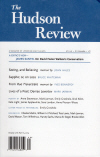The Hudson Review – Winter 2014
“As Han-shan observed, / sometimes there is no Zen, / only hermits plodding up and down Cold Mountain.” These opening lines from Dick Allen’s brief poem “As Han-shan observed” nicely paraphrase a key question at the heart of several essays and reviews in The Hudson Review’s latest issue. Allen’s memorable poem from the current issue not only describes the human tendency to find dogma where none exists, it also calls into question the degree to which an accurate portrait of a person’s interior life can ever be drawn from the exterior evidence available to others.
“As Han-shan observed, / sometimes there is no Zen, / only hermits plodding up and down Cold Mountain.” These opening lines from Dick Allen’s brief poem “As Han-shan observed” nicely paraphrase a key question at the heart of several essays and reviews in The Hudson Review’s latest issue. Allen’s memorable poem from the current issue not only describes the human tendency to find dogma where none exists, it also calls into question the degree to which an accurate portrait of a person’s interior life can ever be drawn from the exterior evidence available to others.
Bruce Whiteman, in his essay “Saphho; or, on Loss,” surveys the many subjectivities translators have created for Sappho throughout the long history of her work’s translation into English. Whiteman highlights the enduring appeal that the biographical vacuum surrounding Sappho and the fragmentary nature of her work have held for readers and translators alike. Reflecting on the extraliterary attraction that Sappho’s work held for writers within the modernist tradition, Whiteman asserts that “poetry inevitably incites us to emotions that are part of its being in the world, even if they are not precisely encoded in the words. Reading Keats, who can ignore how unbearably short his life was?” Whiteman’s essay shows how Sappho’s ability “to remind us of the continuity through 2,500 years of emotion and the inner life of an individual person” accounts for the disparity between the size of her surviving oeuvre and the excessive interest it has provoked.
Charles Martin’s review “Whose Salinger?” offers compelling evidence that J.D. Salinger biographers abhor a vacuum even more than nature does. On his way to reviewing David Shields’s and Shane Salerno’s recently released biography Salinger, Martin surveys the history of Salinger biography, enumerating the many legal, critical, familial, and personal obstacles that have frustrated previous attempts at crafting a balanced analysis of the reclusive author’s life and work. Martin also discusses memoirs written by Salinger’s one time girlfriend, Joyce Maynard, as well as one written by his daughter, Margaret Salinger. However, Martin gives Salinger himself the final word regarding the possibility of organizing the details of a life into anything beyond thoughtful conjecture: “The more I age, senesce, the more convinced I am that our chances of getting through to any intact set of reasons for the way things go are nil.”
James Santel, in his essay “On David Foster Wallace’s Conservatism,” focuses his attention primarily on Wallace’s nonfiction and interviews in order to investigate exactly how the late writer’s valorization of the conservative principle of individual choice stemmed from his belief that we are ultimately isolated within ourselves. Santel details the ways in which Wallace’s “hope that human beings could transcend the limits of selfhood and language to reach one another in meaningful ways” was undercut by a “small-c conservatism” and “deference to individual choice that arises from the inevitability of solipsism and isolation.” Santel’s essay raises provocative questions about the ways in which “Wallace’s unwillingness to offer conclusions sits uneasily alongside his evident desire to change his readers’ thinking.” The essay eloquently describes the ferment of a hermetically sealed mind yearning for a connection it cannot put stock in.
In his round-up review of recent poetry collections “Levels of Ambition,” David Mason goes on a search for vitality in modern poetry, using an excerpt from W. H. Auden’s oratorio For the Time Being for comparison. In doing so, Mason highlights what he sees as the shortcomings and achievements of recent collections by Franz Wright, William Logan, Debora Greger, David Lehman, and Stephanos Papadopoulos. Though comparing anyone’s work to Auden in his prime is likely to prove unkind to the contemporary, Mason’s choice proves to be an inspired one, especially in aiding his appraisal of Franz Wright and William Logan, poets he finds one dimensional. Describing the simultaneously wearying and exceptional aspects of each poet’s writing, Mason asserts that “Wright is all confession, all open sores and sensitivity, while Logan is a prolific ironist.” While calling out modern poetry for a perceived lack of ambition isn’t a new criticism, Mason’s approach feels fresh.
As always, this latest issue of The Hudson Review also contains significant creative work from established poets and writers, but what continues to make The Hudson Review one of the premier journals of literature, arts, and culture is the academic rigor and penetrating intelligence of its essayists and reviewers. Whether they’re writing essays on literature; chronicles of film, dance, art, theatre, and music; or reviews of recently released books, the writers take great pains to situate their judgments within a larger critical context in ways that are engrossing and inventive.
[www.hudsonreview.com]





